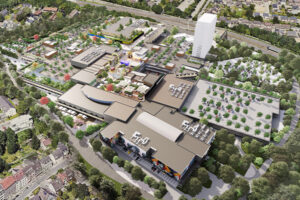By Steffen E. Friedlein
The coronavirus pandemic still has a firm grip on the retail and shopping center industries. The situation in which we have now found ourselves for more than a year has pushed retailers and tenants, investors and operators, and even customers to their limits. Indeed, the industry will be forced to deal with the effects of the lockdowns for some time to come. With that in mind, it is important to remember that leasing today needs to be about more than just retail. It needs to break new ground, maintain existing portfolios, identify and test new concepts, offer innovative floor-space management, and diversify tenant mixes – all while keeping a close eye on the post-pandemic era.
Solutions Built on the Spirit of Partnership are Indispensable
The importance of ongoing and collaborative dialog with tenants cannot be overstated. Many retailers feel that their very existence is threatened: They are considering closing locations and are streamlining their store networks to counter the economic impact of the pandemic. That makes constructive approaches all the more important in order to rapidly implement viable solutions tailored to the individual tenant. In that respect, we have been very successful at ECE: In Germany, we have been able to jointly hammer out solutions with more than 90% of the tenants affected by the temporary closures imposed by the authorities during the first lockdown. During the second lockdown, we, once again, succeeded in offering and implementing a 50/50 rent assistance deal with many tenants – all with the goal of helping them through this difficult time.
In the future, we will also see increased demand for more flexible contractual solutions, particularly when it comes to giving new and innovative concepts the opportunity to be tested and flourish – thereby introducing fresh ideas at the retail locations – or in terms of offering both tenants and landlords greater flexibility. After all, the term of the lease is only one of several criteria that determine whether a partnership will be successful, and this is especially true in strong and particularly in-demand retail locations, such as well-established shopping centers. In this context, finding balanced solutions with all of the stakeholders continues to be of the utmost importance. Now, more than ever, tenants and landlords are dependent on each other.
The Pandemic Has Accelerated Digitalization
In addition, the process of digitalization in retail and at shopping centers has also gained significant momentum as a result of the coronavirus. On the one hand, future-proof concepts that connect the online and offline worlds – which were in development before the pandemic – must now be implemented and expanded as quickly as possible. Offering merchants multiple ways to reach their customers is the name of the game. In this respect, it is also essential that retailers today integrate digital solutions into their business processes. Who is better equipped to provide them with the right support in the form of technology and expertise than shopping center operators? At ECE, for example, we established a dedicated department years ago that systematically advances and continues to expand digital innovations and connected commerce services, such as our Digital Mall.
On the other hand, tenants need to benefit from and be supported by the use of innovative and digital tools on site – whether via a dedicated app that can be used as a platform for communication between centers and tenants or solutions implemented at short notice to manage “Click & Meet” appointments or contact tracing. In this case as well, the coronavirus has underscored the importance of digital solutions.
Increasing Shopping Centers’ Appeal
Even if visitor numbers at many centers are currently lower than they were before the coronavirus as a result of the restrictions, after the pandemic, they will be more in demand than ever as lively and dynamic marketplaces. According to a study by Simon-Kucher & Partners, customers miss brick-and-mortar retail, with 90% of respondents indicating that they are looking forward to being able to visit local stores again once the lockdown has been lifted. In addition, 60% are looking forward to getting together with friends and family in the course of local shopping trips. Furthermore, the periods during which the restrictions were relaxed also showed us how quickly customers return to brick-and-mortar retail outlets. Shopping and leisurely strolling through their local centers has been sorely missed by many customers.
Such customers expect wonderful atmospheres and shopping centers, in their function as places for leisure and entertainment, to always offer new and exciting things to experience above and beyond shopping. That is why it is extremely important that retail locations continue to be systematically and intensively enhanced. Escape rooms, eSports arenas, trampoline parks, innovative new store concepts, and comprehensive refurbishments are essential. Service offerings, such as health and/or beauty centers as well as shopping centers as mixed-use assets that combine shopping with living, working, and hotels are all important components of the shopping centers of the future.
While many of these concepts have long since been implemented by ECE, the pandemic has accelerated the execution of other ideas, and other concepts have had to be completely reimagined in a very short period of time. One thing is clear: brick-and-mortar retail and shopping centers must continue to evolve and continuously reinvent themselves. Only then will they be successful in the future.





